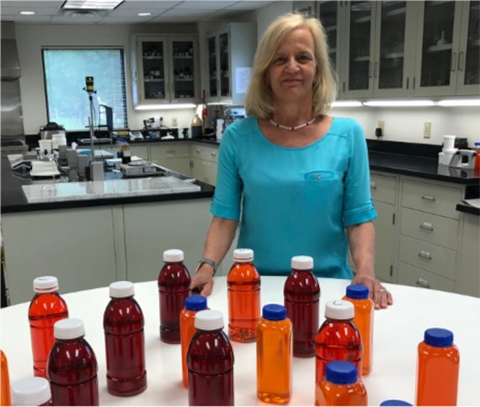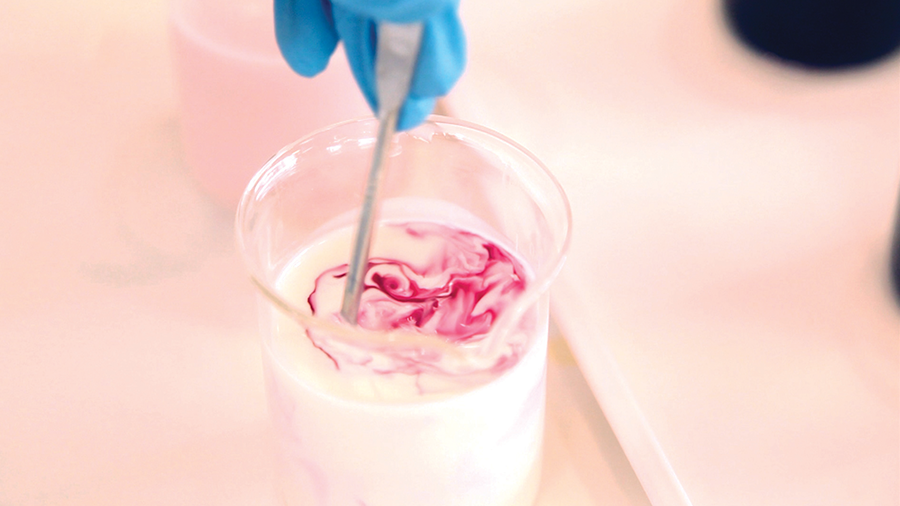Job variety and stability in the food and beverage industry
If you read my most recent column or my colleague Martina G. Efeyini’s most recent column, then you know we’re on a kick about jobs in the food and beverage industry. In an effort to highlight the huge variety of jobs available to scientists in this sector, I’m sticking with it this week too.
Food and beverage products require a lot of scientific development prior to showing up in our grocery stores. Thus, companies in the industry need researchers with a variety of backgrounds. If you’re interested in a career path in industry research that doesn’t focus on the life sciences, this could be for you.

I talked with Jody Renner–Nantz of DDW, The Color House, a global manufacturer of natural colors. Many of these colors are used in the food and beverage industry to replace synthetic colors and thus require specific manufacturing and development. This is where the research comes in. Companies across the food universe need this kind of expertise so, while I’m focusing on DDW today, keep in mind that other companies may have similar roles.
A focus on food science
For my previous column, I spoke with Andrew Kendrick, a research and development manager with DDW. Kendrick earned his Ph.D. in biochemistry before focusing on food science and is based out of DDW’s U.K. branch. Renner–Nantz, on the other hand, said her career has always centered on food science.
“Food science was a good fit for me because it allowed me to utilize my passion for science in a very practical and applied way,” she said.
After earning a B.S. in food science from Purdue University, she worked in product development (her first project was at a chicken processing plant that produced 2 million pounds of fried chicken per week) and as a research technician. She earned her master’s degree in food science at the University of California, Davis.
Now at DDW, she’s an application manager for the Americas. In this position, she provides the technical expertise needed to address the challenges clients face when replacing synthetic colors with naturally derived colors in food and drink products.
“My day-to-day job is always interesting,” Renner–Nantz said. “It’s highlighted by technical interactions with customers, preparing color samples to address customer product-development requests as well as working with the production group to manufacture colors for successful customer projects.”
Job variety and stability
Renner–Nantz held multiple positions in the food industry before landing at DDW. She started in food product development, a complicated and multistep process that spans deciding what a new food product will be to developing the flavors and ingredients it will contain to finalizing a marketing strategy once it’s ready for consumers.
She also worked in a more research-focused position as a technician. These roles are valuable in the food and beverage industry because technicians assess the physical, chemical and microbiological composition of products.
When she became an application manager at DDW, Renner–Nantz said, “it was a new challenge to work in the ingredient area.” But she got the hang of it and now serves as a primary facilitator between product-development teams and customers.
Renner–Nantz’s employment history highlights the variety of jobs researchers can occupy within the food and beverage industry.
In addition to the variety, the industry is appealing because of its stability. DDW, for example, is considered an essential business because it supplies color ingredients to food manufacturers. So, with extra precautions, her work hasn’t stopped during the COVID-19 pandemic.
“One of the reasons I chose a food science career was that I thought I’d have several options for gainful employment,” she said. “Little did I know how that thought would play out amidst this pandemic.”

Advice for those on the job market
While Renner–Nantz has extensive training in food science specifically, it’s not a requirement to break into the field. Many of the R&D positions (especially those that focus on specific ingredients instead of processing) rely on the very technical skills that researchers naturally hone through experience. Having knowledge of a certain technique or biological process is immensely valuable and can be leveraged when applying for jobs.
Renner–Nantz said the best thing you can do to prepare yourself for a career in this business is to apply for internships that will hone your professional skills. Gaining experience and on-the-job training during these internships will help you decide on the path you might want to pursue within the sector.
“The food industry is a great choice for a career because there are many different professional paths you can pursue,” Renner–Natnz said. “From management to product development, basic research, quality control, production and others.”
Furthermore, intern experience will show that you know how to work with others in a team environment. We’ve heard time and time again how important this element of teamwork is to success in an industry role, so don’t overlook it.
If you can’t swing an internship during college or grad school, think about how you can use the experience you do have to your advantage. Regardless of your research training, you’ve likely had to work in a team setting. Highlighting this on your résumé can be beneficial during the job-application process, even if it’s only a collaboration between yourself and your other lab mates.
Also, as Kendrick noted in my previous column, don’t limit yourself by applying only to positions that exactly match your technical training or background. Research in any field relies on a strong understanding of the scientific method and rigor. Use your training in this to your advantage and cast a wide net when applying for entry-level jobs.
Once you’re on the job, you’ll be able to learn the industry and more selectively navigate to the next steps you want. Stay tuned for more content on jobs in the food and beverage industry!
Enjoy reading ASBMB Today?
Become a member to receive the print edition four times a year and the digital edition monthly.
Learn moreFeatured jobs
from the ASBMB career center
Get the latest from ASBMB Today
Enter your email address, and we’ll send you a weekly email with recent articles, interviews and more.
Latest in Careers
Careers highlights or most popular articles

Upcoming opportunities
ASBMB's PROLAB award helps graduate students and postdoctoral fellows spend up to six months in U.S. or Canadian labs.

From humble beginnings to unlocking lysosomal secrets
Monther Abu–Remaileh will receive the ASBMB’s 2026 Walter A. Shaw Young Investigator Award in Lipid Research at the ASBMB Annual Meeting, March 7-10 in Washington, D.C.

Chemistry meets biology to thwart parasites
Margaret Phillips will receive the Alice and C. C. Wang Award in Molecular Parasitology at the ASBMB Annual Meeting, March 7-10 in Washington, D.C.

Decoding how bacteria flip host’s molecular switches
Kim Orth will receive the Earl and Thressa Stadtman Distinguished Scientists Award at the ASBMB Annual Meeting, March 7–10, just outside of Washington, D.C.

Defining JNKs: Targets for drug discovery
Roger Davis will receive the Bert and Natalie Vallee Award in Biomedical Science at the ASBMB Annual Meeting, March 7–10, just outside of Washington, D.C.

Upcoming opportunities
No matter where you are in your career and what future path you aspire to, everyone needs leadership skills. Join ASBMB for practical strategies for building and practicing leadership skills.

